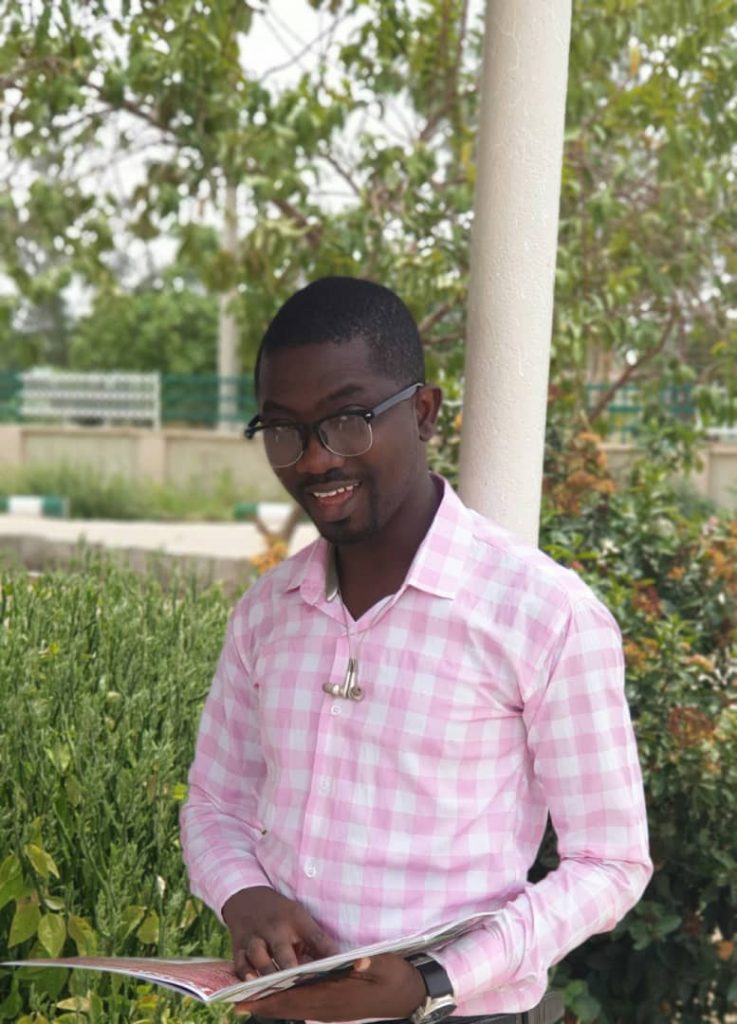

I
I was five when my parents loaned me out to my grandmother. My mother just gave birth to my younger sister, Demilade, when grandma came to help my mother cope with the burden of her new birth. She stayed for a month. I grew so fond of her that she suggested to my mother if she could take me over to her place in the village.
“I hope her father would oblige you, Mama.” My mother responded with palpable doubts in her eyes.
“He will, mummy. He will.” I claimed with a soft voice, threatening to cry.
The brown, rickety roofs lying over the mud and brick houses scattered over the village closely matched the brown dusty road that led to my grandparent’s house. Their house sat in the belly of the village, close to a stream. A garden filled the backyard. Two mighty mango trees manned the vintage; their crispy, yellow, fallen leaves littered the ground. The leaves made music as our feet brushed through them.
“We describe our house to visitors using these trees as landmarks.” Grandmother said in Yoruba pointing at the two mango trees before she beat the sweat collected over her brow away.
Soon, I became used to the village life: hunting for rats, squirrels and snails in the bush, peasant farming, going to the market at the village square every four days, obliging grandmother when she forces a particularly bitter concoction down my throat every Saturday morning, fetching water from the slowly flowing stream near our home and collecting firewood.
I would listen to grandmother tell stories as the night thicken. When she finishes her stories, she would slide her finger into her mouth and make it give some pop sounds from her puffed cheeks. The pop sounds attest to the truth of her stories. They give credence to her stories.
II
I sucked my right thumb as a habit. My mother had complained about it several times before I left the city. It was only three weeks after I came to the village before my habit earned me a mocking nickname from my grandfather. He would call me, A mùka d’àgbà. One who sucks his finger into adulthood. It would pain me. I would fight it. I would still suck my thumb afterward.
One morning, my grandmother lured me to the kitchen. She grabbed my thumb and smeared it with a paste of bitter leaf. I sucked the bitterness away until I felt my sweet thumb again.
“See you, Finger-licker.” My grandmother quipped me in Yoruba, clapped her hands shamefully at me before starting to sing a song to tease me. I stomached the shame, felt it ached my tummy, but I was helpless. I still sucked my thumb.
III
I went to collect wood for fire, one afternoon. My grandfather had returned from his farm before the sun became intense. He brought tubers of yam and a dead squirrel nabbed by his trap. I went with him last evening to set the trap. I gathered the wood and clutched them between my arms and chest. I noticed a scorpion crept under one of the logs. Its tail curved. I threw the wood off. The sleeve of my shirt caught the scorpion, and before I could figure out how to dislodge it, it sank its tail into my right thumb. I screamed. I shook my thumb as the pain traveled within my bones.
“Did you kill the scorpion?” Grandma asked, her voice full of pity.
I sobbed and replied, “No.”
“Had it been you killed it, we would have used it to make anti-venom for you.”
I started another rounds of tears. The pain felt like a live coal inside my thumb. It made me stopped sucking my thumb. Whenever my throat craved for my thumb, the pain would forbid me from sucking it.
IV
I blew the smouldering flame with my mouth, eyes closed and head bent to the side of the big, tripod stones. After the third blow, the flame came alive.
My aunt peeled the yam and loaded the pot with the pieces of peeled yam.
I sat at the fireplace, watching my aunt and grandmother pound. Pestles began to descend into the mortar. My uncle heard grandmother call out to him to come over and pound yam. He gawked to the back of the house, tiptoed to the tip of the garden at the backyard and disappeared. He did the same thing last week.
Grandmother started the folksong as they continued to pound and make thrilling beats with the pestles, then my aunt joined in the singing. The song dwindled as they wrapped mounds of pounded yam with banana leaves.
My uncle reappeared in the manner in which he left; he tiptoed to the edge of the garden and gawked his way through into his room.
I giggled in my heart. Grandmother was soft on him this time around; the abuses were not as I had expected.
My uncle spread a mat under the mango trees. The dying, orange sun slithered through the swaying leaves of the mango tree. The leaves made some hushing sounds.
Grandmother placed our meals on the mat. Pounded yam and Ẹfọ riro scented with iru. An avalanche of the squirrel meat squatted inside our plates of soup. She is fond of serving us our meals.
She went into the parlour to devour her own meal. A small ration compared to even mine, the youngest in the house.
V
I heard grandmother complain to her friend from the parlour, “My friend, every time I pound yam like this, I lose my appetite for the food. It’s because I have satisfied my appetite with the aroma while I was making the food. And, it goes for every meal I do.”
My grandmother’s friend, Iya Titi, was a popular auxiliary nurse. She worked in the village’s dispensary clinic. She had come to collect my grandma’s part of the weekly contributions. Twenty of them were in on the ajọ. My grandmother would cash out last which would be in December. She has promised to use the money to get a fine cloth for me for Christmas and the New Year.
Grandfather asked me to fetch the gourd of palm wine from a side of the room. He told me to bring a calabash from the kitchen too.
I sauntered into the parlour, clasping my plate of food to my chest.
“Mama nurse, good evening.” I barely prostrated. A faint smile plastered my face. I made to show her my thumb, perhaps I would get some drugs from her for my pains. Grandmother looked at me from a side of her eye. She eyed me many times. Her friend did not notice it. I became numbed. I walked solemnly from the room into the kitchen.
VI
I sipped a mouthful from the gourd because my grandfather would not allow me to drink palm wine. I grabbed the gourd and calabash with one hand and held my plate of food to my chest with the other hand. My grandmother yelled at me in Yoruba, “Why can’t you leave your food here and come back to carry it later?” She continued, using her finger to touch the side of her head, “Use your number six, Kunle.”
I began to drag my feet as I moved away from her sight, towards the mat.
She shouted again, “Be sure to drop and waste your food, you hear me? I know your stomach is full already.”
I sprawled and poured my food on the ground. It was like her words were a kind of prophecy. Some palm wine spilled from the gourd to the ground. Grandfather ran to me to scuttle the gourd from my hand.
“Give me my gourd!” He shouted.
A cricket chirped. The night grew darker. We slept.
VII
The scorpion bite still hurt and I have missed sucking my thumb too. My thumb started making yellow, sticky pus. The pain had increased. Then I began to suffer from fever.
“Kunle,” grandmother called me gently before she put some herbal mesh on my thumb and strapped my thumb with a piece of rag.
“It would go, soon, my child. This pain would soon resolve.”
I nodded to affirm grandmother’s words between winces.
She began to chant a panegyric for me as she forced me to gulp an herbal drink. A whirlwind of nausea rose inside my stomach and settled on my tongue. I belched and vomited.
VIII
My mother did not call the village to tell me or grandmother that she has been having sleepless nights.
“I have been hearing my son call me for some days now. I heard it inside my ears.” She said to my father after she couldnt cope anymore. She told me she tried to pressed the matter home for my father, so she alerted him specifically, “Eti mi n ja fa. I hear Kunle call me in my ears.
“Maybe it’s your mind. Kunle is fine. I believe nothing is wrong with him. Or did you hear anything from the village?” My father replied her. They prayed for my safety after much pressure from my mother and they slept.
“Dear, I’m going to the village in the morning.” My mother told my startled father. She then pulled the cover cloth over her head and concluded, “Something is wrong in the village.”
“Don’t bother yourself, eh. Now you will make Kunle turn his attention back to the city. Grandma would think we are trying to stylishly take our son back to be with us. And you know, I hate petty talks.”
IX
I crouched on my mat. It was made from a hand-woven raft. They said the local mat feels better than the synthetic ones in the city. I whispered some prayers in my heart before I slept. “God, please, let mummy come. I need some tablets. I want to go home. I’m dying from these local medications.”
As soon as I heard my mother’s voice in the backyard the following day, life surged inside my spirit. I felt newness in my bones. Even my finger felt less hurtful.
My mother watched my poor body on the mat with empathy. She squatted beside me and felt my skin. “You have fever,” she said.
She pulled my lower eyelids to check if I have enough blood left in my body. She tried to touch my bad finger.
“Yee! Yee!” I cried out and forbade her.
“My dear, you’re going home tomorrow. You need to see a doctor.”
I raised my back against the wall with my elbows. She supported me to adjust well. Our eyes met and I pursed my lips to ask: “How did you know that I’m sick, mother?”
She looked at me closely, cupped my head inside her arms and said between tears, “I know. I just know. Each time I heard you inside my ears, my breasts hurt me.”
About the Author

Adesina Ajala has works in Libretto, Eboquills, Arts-Muse Fair, Parousia and elsewhere. He was second-runner up Shuzia Creative Writing Contest (3rd Edition) and winner of both Freedom Voices Poetry Writing Prize (2019) and Splendour of Dawn Poetry Foundation (January 2020). Adesina shares his time between creative writing and medical practice.




Average Rating